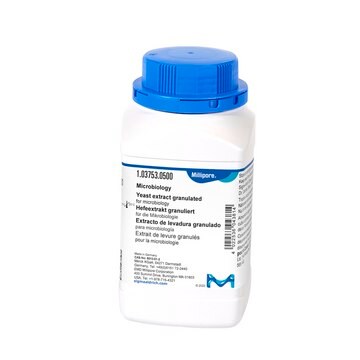1.01614
Agar
granulated, purified and free from inhibitors, suitable for microbiology
Synonym(s):
Agar-agar, Gum agar
Sign Into View Organizational & Contract Pricing
Select a Size
All Photos(2)
Select a Size
Change View
About This Item
Linear Formula:
(C12H18O9)n
CAS Number:
MDL number:
UNSPSC Code:
41106212
EC Index Number:
232-658-1
NACRES:
NA.74
Recommended Products
biological source
algae
Quality Level
form
solid
potency
11000 mg/kg LD50, oral (Rat)
shelf life
limited shelf life, expiry date on the label
packaging
pkg of 1 kg
pH
6.8 (20 °C, 100 g/L in H2O)
mp
90 °C
solubility
slightly soluble 20 g/L
bulk density
550 kg/m3
Looking for similar products? Visit Product Comparison Guide
Related Categories
General description
Agar is widely used in microbiology as a solidifying agent in microbial culture media. It is a polysaccharide derived from seaweed and is primarily composed of agarose. Agar is a mostly inert substance, which makes it an ideal material for microbial culture media because it doesn’t interfere with the growth of microorganisms. Agar can solidify media, allowing microorganisms to grow in a solid environment, which facilitates the formation of distinct colonies and selective isolation of specific microorganisms. Agar is also used in the preparation of selective and differential media, which can provide additional nutrients or other chemical substances to promote or inhibit the growth of specific microorganisms selectively. Agar is sterilized by autoclaving and then poured into Petri dishes, where it can cool and solidify, forming the surface for microbial growth.
Application
Agar is commonly used as a solidifying agent in many microbial culture media for the growth and identification of bacteria, yeasts and molds from various pharmaceutical, environmental, food and beverage samples.
Features and Benefits
Our Granulated media are:
- Safer - Significant reduction of inhalation of toxic and allergenic substances resulting in fewer allergic responses. Less contamination of working tools and environment
- Accurate - No separation of components and no clumping, even under humid or warm conditions, ensure a uniform product with higher performance accuracy
- Fast - Rapid and uniform dissolution in water
- Easier - Easier handling and weighing due to the better flow properties
- Reliable - Homogenous distribution of ingredients guarantees high reproducibility even if only small amounts are used.
Linkage
Replaces: 1.01614.5007
Analysis Note
Appearance (colour): brownish-yellow
Appearance (description): granules
Identity (NIR): passes test
Identity (Iodine - test): passes test
Identity (Solidification point): passes test
Identity (Turbidity - test): passes test
Solidification point: 32 - 36 °C
Ca (Calcium): ≤ 0.5 %
Mg (Magnesium): ≤ 0.1 %
Sulfated ash (600 °C): ≤ 6 %
Loss on drying (105 °C; 4 h): ≤ 12 %
Growth (Escherichia coli ATCC 25922 (WDCM 00013)): passes test
Growth (Streptococcus pyogenes ATCC 21059): passes test
Growth (Staphylococcus aureus ATCC 25923 (WDCM 00034)): passes test
Growth (Shigella sonnei ATCC 29930 (WDCM 00127)): passes test
Growth (Streptococcus agalactiae ATCC 13813): passes test
Growth (Streptococcus equinus DSM 20062): passes test
Growth (Streptococcus pneumoniae ATCC 6301): passes test
Growth (Candida albicans ATCC 10231 (WDCM 00054)): passes test
Suitability for microbiology: passes test
Appearance (description): granules
Identity (NIR): passes test
Identity (Iodine - test): passes test
Identity (Solidification point): passes test
Identity (Turbidity - test): passes test
Solidification point: 32 - 36 °C
Ca (Calcium): ≤ 0.5 %
Mg (Magnesium): ≤ 0.1 %
Sulfated ash (600 °C): ≤ 6 %
Loss on drying (105 °C; 4 h): ≤ 12 %
Growth (Escherichia coli ATCC 25922 (WDCM 00013)): passes test
Growth (Streptococcus pyogenes ATCC 21059): passes test
Growth (Staphylococcus aureus ATCC 25923 (WDCM 00034)): passes test
Growth (Shigella sonnei ATCC 29930 (WDCM 00127)): passes test
Growth (Streptococcus agalactiae ATCC 13813): passes test
Growth (Streptococcus equinus DSM 20062): passes test
Growth (Streptococcus pneumoniae ATCC 6301): passes test
Growth (Candida albicans ATCC 10231 (WDCM 00054)): passes test
Suitability for microbiology: passes test
Storage Class
11 - Combustible Solids
wgk_germany
WGK 1
Certificates of Analysis (COA)
Search for Certificates of Analysis (COA) by entering the products Lot/Batch Number. Lot and Batch Numbers can be found on a product’s label following the words ‘Lot’ or ‘Batch’.
Already Own This Product?
Find documentation for the products that you have recently purchased in the Document Library.
Customers Also Viewed
Our team of scientists has experience in all areas of research including Life Science, Material Science, Chemical Synthesis, Chromatography, Analytical and many others.
Contact Technical Service




